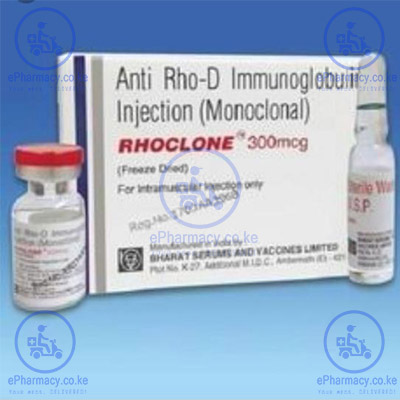Description
Uses and Administration of Anti-D Injection
Anti-D immunoglobulin is used to prevent a rhesus-negative mother in Kenya actively forming antibodies to fetal rhesus-positive red blood cells that may pass into the maternal circulation during childbirth, abortion, or certain other sensitising events. In subsequent rhesus-positive pregnancies these antibodies could produce haemolytic disease of the newborn (erythroblastosis foetalis). The injection of anti-D immunoglobulin is not effective once the mother has formed anti-D antibodies. Anti-D immunoglobulin is also used in the management of some blood disorders, primarily idiopathic thrombocytopenic purpura.
Anti-D immunoglobulin should always be given to rhesus-negative mothers with no anti-D antibodies in their serum and who have just delivered rhesus-positive infants. It should be given as soon as possible after delivery but may give some protection even if administration is delayed beyond 72 hours. In the Kenya, the Blood Transfusion Services recommends a dose of 300 units by intramuscular injection and this will clear up to 4 mL of fetal red cells. An additional dose may be required depending on the amount of transplacental bleeding as assessed by the Kleihauer test; for bleeds exceeding 4 mL an additional 125 units for each mL of red cells will be required.
For routine antenatal prophylaxis, two doses of at least 500 units of anti-D immunoglobulin should be given at 28 and 34 weeks’ gestation. Postnatal prophylaxis is still necessary.
There is also a risk of sensitisation during pregnancy from spontaneous, induced, or threatened abortion, amniocentesis, or external version. Any rhesus-negative woman at risk of transplacental haemorrhage during pregnancy and not known to be sensitised should be given 250 units at up to 20 weeks’ gestation and 500 units of anti-D immunoglobulin after 20 weeks’ gestation.
Anti-D immunoglobulin is also given to rhesus-negative women of child-bearing potential after the inadvertent transfusion of Rh-incompatible blood, or after receiving blood components containing rhesus-positive red cells or organ donations from rhesus-positive donors. The dose is based on the amount of red blood cells transfused; up to 125 units/mL of transfused cells may be used.
In the USA, doses of anti-D immunoglobulins have traditionally been higher than in the UK and Kenya; dosage recommendations are based on a standard dose that is capable of suppressing the immune response to 15 mL of incompatible red blood cells. One-sixth of this dose may be used up to 12 weeks of gestation for sensitising episodes.
For idiopathic thrombocytopenic purpura, an initial dose of 250 units/kg (50 micrograms/kg) of anti-D immunoglobulin by intravenous injection is given. Maintenance doses will depend on the clinical response.


Reviews
There are no reviews yet.